Chef to Chef, hosted by Chef Brian Roland
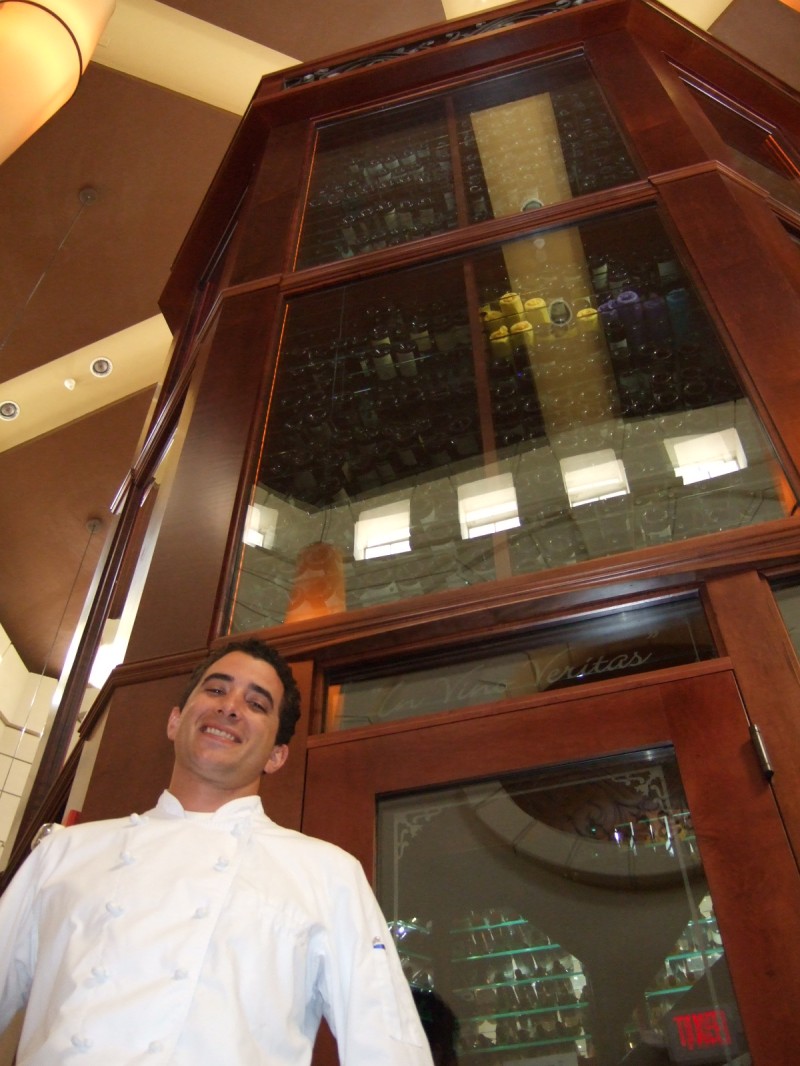
Chef Nick Costanzo of Angelina's
BR: Tell us a little bit about where you’re from, what your training was. I know you are a fellow New Jerseyan, you actually grew up in the same home town that I did, which we found out later after we met each other. When you were growing up what inspired you to be a chef?
NC: I grew up in West Windsor, the suburbs right around Princeton, New Jersey and there was a lot of influence from my mother. She always cooked a unique meal every night. There wasn’t any short cuts. No TV dinners or anything like that. I've just always loved food. Both of my grandmothers live down here. Whenever I’d come here, I just loved all the food that both of them made.
BR: Are they both Italian?
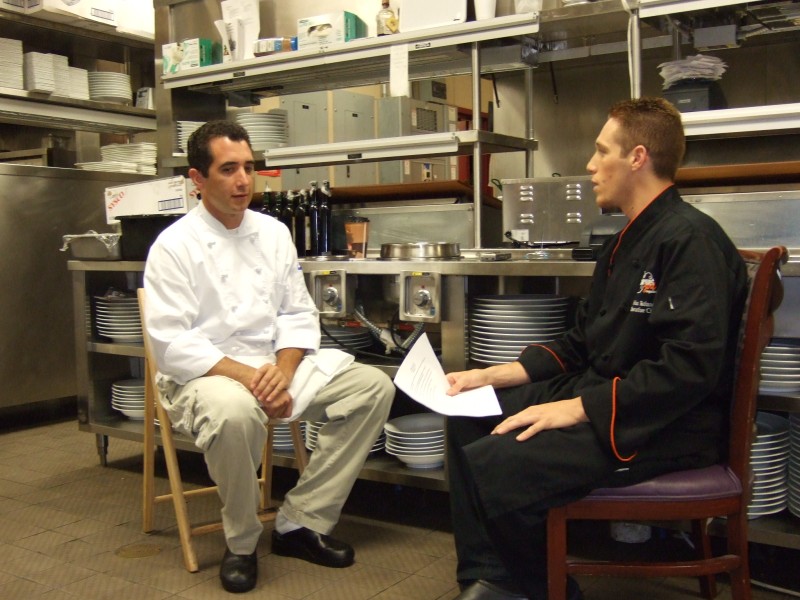
NC: One of them is Italian and the other one is English. I think that is where a lot of my inspiration came from, although I didn’t know it at the time. It wasn’t like I knew I was going to be a chef at 16 years old. But I’ve been working in a restaurant since I was 15 years old. Went away to college actually for marine biology. One of my other passions is fishing and I figured that would translate, but it didn’t. (They both laugh). I lived in Charleston for about a year or so before I decided that cooking was something that I wanted to pursue. I never really looked at it as a career path but after going to a culinarily rich city, such as Charleston, I realized that there was something there, something that I could really go off and do.
BR: So you went off to culinary school.
NC: Well Charleston had a culinary school and it’s one of the best culinary cities I’ve ever been in other than New York and Chicago. It’s just a great city for food. I got to go to Johnson & Wales, I went for two years and trained at one of the best restaurants in the area, Peninsula Grill That’s basically where I got my foundation for fine dining.
BR: We’ll come back to where you’ve been. Let’s talk about Angelina’s. Where you’re at now, you guys are pretty much the new kid on the block. I know that you guys are doing high volume. You’re back here in the kitchen working with your staff. If you could talk to every guest that dines here at your restaurant what type of conversation would you have, what types of things would you ask them?
NC: As a chef you always want to know how their dining experience is going and what they think of the food. Especially, when we’re new. Whether you’re new or not, feedback is always important. But more so that we’re new, we’re putting out a new product, people are trying us out for the first time. It’s very important to get an idea of what they truly think. Whether or not they are going to tell the chef the truth, remains to be seen. I may not always get an honest answer but I think it is very important to; first of all, make them feel very comfortable, make sure they are having a good time, but then also to get a little feedback on the food.
BR: Food, the restaurant industry, seems to evolve almost on an hourly basis. I think we are starting to see so many different trends in the industry that occur. Every restaurant and chef tries to get a hold of whatever that trend is and apply it in their own kind of fashion at the restaurant. Seeing as there are a lot of trends out there what do you forecast for the future? What do you see that is popular now and what do you think is next?
NC: I think depending where you’re at will determine what the trends are. I think in the bigger cities are more like media trends, the newest trends. Where here, Southwest Florida, it might be a little bit different. Our trends are a little bit different than in big cities. I try to combine the two, something from New York with something from here. A trend that’s already been very popular in fine dining restaurants, something that we try to philosophize here, is using high quality ingredients. The freshest quality, sometimes it’s simple preparation. From chef to chef it might be a little cliche, but not all customers get to experience that. (Brian: Sure) It’s one thing that we’re really pushing for here.
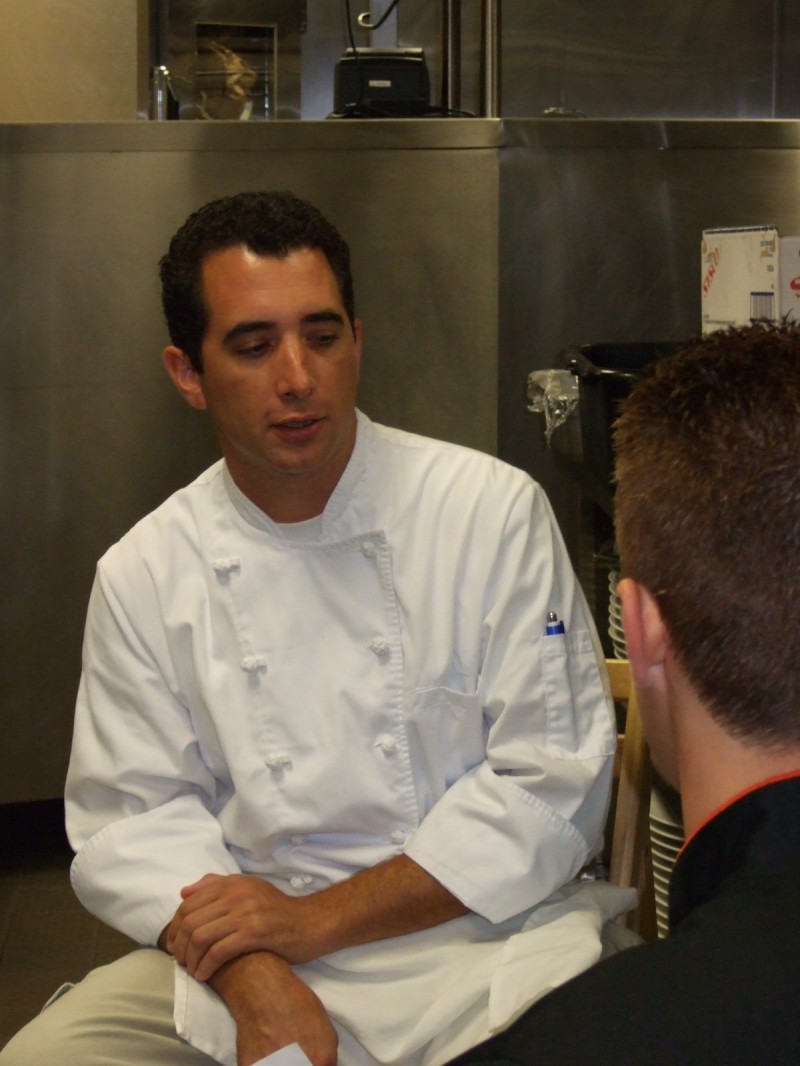 BR: For me I know that sustainable agriculture, buying local. All those things tend to be really important now and popular to the consumer. They want to feel good about what it is they are eating. They want to feel good about where you are getting the product from. How do you feel about sustainable agriculture and do you buy local?
BR: For me I know that sustainable agriculture, buying local. All those things tend to be really important now and popular to the consumer. They want to feel good about what it is they are eating. They want to feel good about where you are getting the product from. How do you feel about sustainable agriculture and do you buy local?
NC: I do try to buy local. We , Elaine, Lou and I, were talking about farmers up in Punta Gorda. We work with a farmer in Fort Myers for a lot of our herbs. We try to support our local agriculture as much as possible. Unfortunately, a lot of local agriculture, they take business and outsource to bigger companies. But I think you are seeing a growing trend around here for farmers to sell local. I’m all about that. I really enjoy organic, all natural products. Farmers and food producers that don’t work with chemicals or hormones, antibiotics and all that kind of stuff.
BR: The Green Craze. What is the green craze?
NC: The green craze can get a little crazy. I don’t really buy into the USDA organic certified stamp because there are ways for bigger farmers to get around some of these standards that have been set. I think farmers that just label themselves as all natural and put everything out there for you to see. You know exactly what goes into their product. Those are the kind of companies that I prefer to do business with. That’s as far as vegetables and on the land. I think something that is more important, at this point in our world, is the ocean. Sustainable farming practices out in the ocean. A lot of these fish are over fished. Locally, you’re talking grouper and snapper. There are times of the year when it’s very difficult and you can’t get grouper. It’s a very high priced item, because it’s just not out there. I think the world has to adopt more sustainable farming techniques out on the ocean.
BR: I agree completely. Do you do much cooking at home?
NC: Generally when I’m working a lot, I don’t cook as much at home. But every now and then I cook something special.
BR: What style of cooking would you say, overall, not just at home or the restaurant, is your best bet?
NC: Best bet, just taking advantage of the ingredients that are available. Like we talked about. The freshest. The best that are available. You take a simple ingredient and you make it amazing. Do I have an actual cuisine that I enjoy cooking the most? That's difficult to say. But I do enjoy Italian. I’m not saying that because I work in an Italian restaurant (laughter), but I do enjoy eating it and making it. I’m definitely into the Old World Italian cuisine right now. Not so much Italian-American, I’m definitely trying to get back to regional Italian cuisine. I think it’s something that is sorely missing in this area.
BR: Like Batali does?
NC: Yes, similar.
BR: Your roots coming from Pazzo and Zoe’s, what have you learned along the way that has made you who you are today?
NC: I’ve learned that it is all about the customer. Even though we are chefs ,we like to think sometimes that we are the most important part of the restaurant. No matter what, it comes down to the customer. You have to do what you can to make them happy.
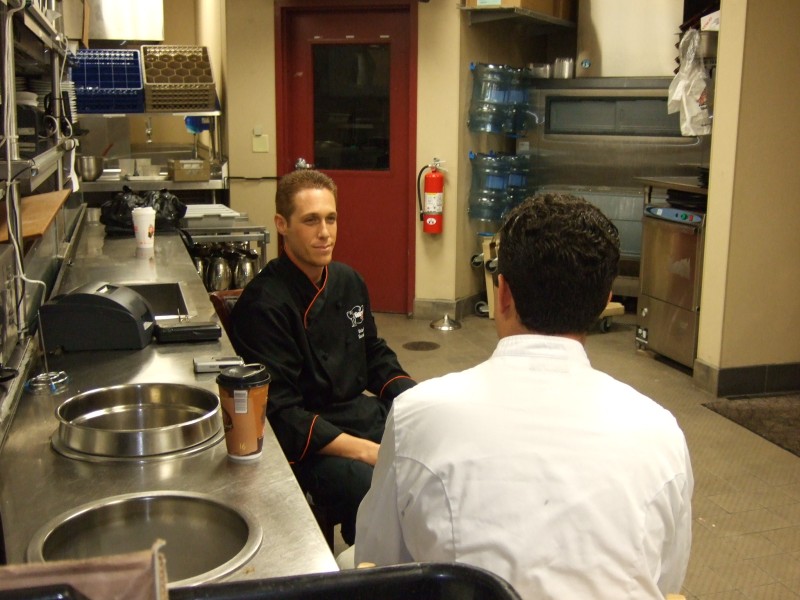 BR: I know for myself I’ve had a lot of inspirations in my life growing up. I know that you said your mother and grandmother were a big inspiration to you. If you could work for any chef in the world, who would it be and why?
BR: I know for myself I’ve had a lot of inspirations in my life growing up. I know that you said your mother and grandmother were a big inspiration to you. If you could work for any chef in the world, who would it be and why?
NC: I think working for someone like Batali would be cool. Though I’m not sure that he’s working in restaurants much anymore. Working for someone like that would be really neat. But Chef Eric Rupert of La Burnadine? He has one of the five, 4 star restaurants in New York. He’s very famous for his seafood. He’s on one of the final episodes of Top Chef. I read some stuff about him and I thought it was amazing. He and his family are from a small fishing town in France. They came over and started with practically nothing and started a restaurant. New York Times 4 Star Rating. With the likes of Alain Ducasse, Daniel and Per Se. To get that rating with fish only, thats'amazing. There is nothing other than fish on the menu.
BR: Do you know where he gets most of his ingredients from?
NC: Probably the local market. Well you know, I think that actually, if I’m not mistaken, I read something about him importing a lot of it from France. So he get’s a lot of it from the Mediterranean and I can almost guarantee that he probably goes down to the Fulton Market.
BR: How do you feel about celebrity chefs and food reality TV shows?
NC: Celebrity chefs we’ve been dealing with for almost 10 years now. We didn’t even know it at first. There are pros and wanna be’s. Someone like Emeril you gotta respect what he’s done for the industry, but he’s gone way too far with it. I think he’s kind of lost sight of food itself. Someone like Batali, someone like Morimoto, I really think they are good chefs, they’re great chefs. They know a lot about the products. When you see a Malto Mario show, he knows every ingredient, he talks about every ingredient. He talks about the regions that he’s cooking from. What he’s talking about and what he’s cooking, is all true and really good. I think there are a few celebrity chefs that I respect but in general I think it is just entertainment.
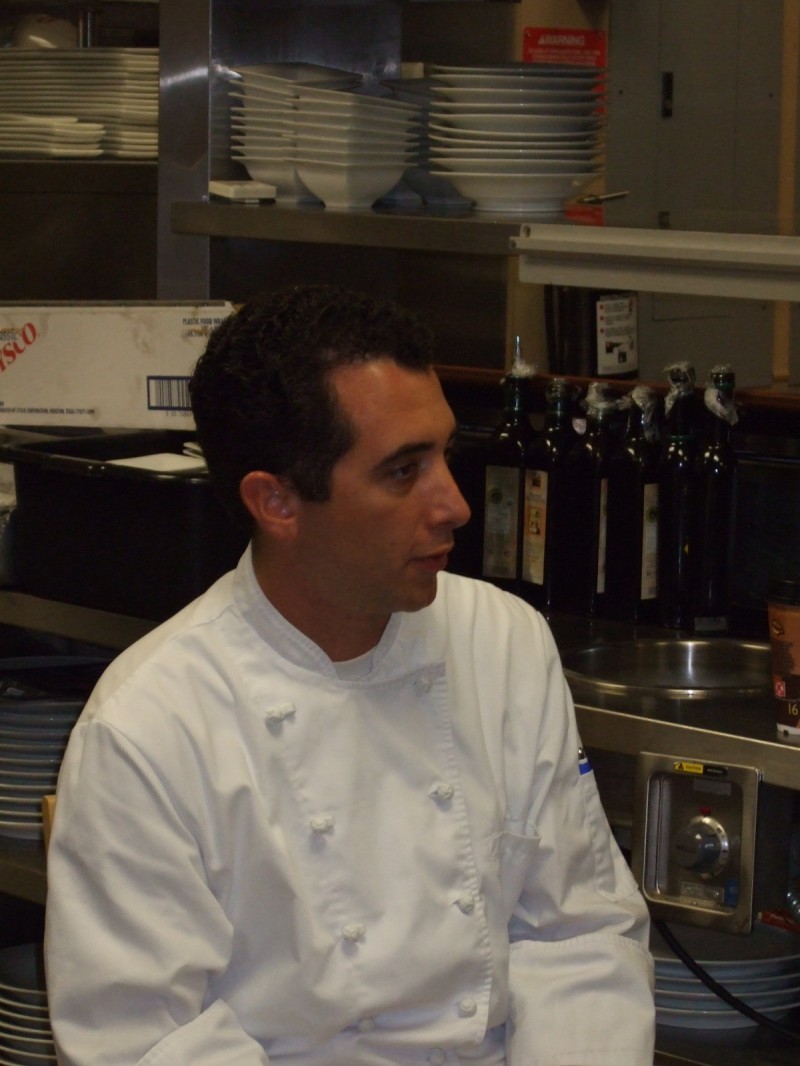 BR: There are also these guys that are really trying to push the envelope in different ways in terms of molecular gastronomy, wow factors at the table. How do you feel about gastronomy and all the chefs that are adding science to their menus?
BR: There are also these guys that are really trying to push the envelope in different ways in terms of molecular gastronomy, wow factors at the table. How do you feel about gastronomy and all the chefs that are adding science to their menus?
NC: I think molecular gastronomy is neat. As a diner, I think it is something that you do every now and then. I don’t want to eat molecular gastronomy every night, I really wouldn’t. I think you’re deconstructing the ingredients too much. That’s just my personal opinion. I think it’s amazing what some people do. We’re talking about chefs that think on a different level. Chefs that are chemists. I definitely respect it and I definitely appreciate it. I would love to go eat at WD-50 (New York City).
BR: I think these guys know more about the ingredients than someone like you and I. They’ve studied it inside and out, they perfected it on a level that we already have perfected. Now they want to gain more knowledge about it and show people that they can do other things with it. How do you feel about that?
NC: I agree and I don’t want to take anything away from them. I think they do understand food much more than I do. I actually worked with someone in Charleston, who has since gone on to become one of the chefs in Charleston, locally, and that’s all they do. Molecular gastronomy. I’ve seen what their kitchen looks like it. I’ve seen the process of what they have to go through on a daily basis. I have an amazing respect for what they do. I think to dine on that and enjoy that, is something that is a very unique experience. A lot of people go out to dine on an everyday basis. We have customers that come in here 3 or 4 times a week. Are they going to want to eat molecular gastronomy on a daily basis? No, I think you take away a little of the pureness of the ingredient.
BR: Can this market support something like that, maybe on a smaller scale?
NC: I don’t think so. This market is so seasonal that you would be able to do it on a part time basis. But if you want to look at overall survival over the course of a year, you do have to appeal to the diners that go out on a regular basis, that will come to your restaurant on a regular basis.
BR: With that in mind, this market, in your opinion, does Southwest Florida have what it takes to support upscale dining 365 days a year.
NC: Absolutely. I think that if you are able to put out a consistent product with high quality, people are going to come to you, regardless. People will to come to your restaurant if they know that they are going to have a great experience and great food. A lot of it does have to do with priceline. I’m not saying that we should lower our prices. I’ve even worked at restaurants that had price gouging. It’s all about the bottom line. It’s about getting the lowest food costs and get the most amount of money you can get from a customer. Customers realize that and I don’t think they want to deal with that.
BR: What do you think makes Angelina’s stand out from the rest? I’m going to say it kind of harshly because that’s what people are thinking. How do you plan to remain on top once the buzz dies down after the first year?
NC: Keep things fresh, unique. We’re not dwelling on what we’ve achieved, we are looking to the future. We have to constantly think about new ways to bring business, even when we are full. I think that part of it is keeping it fresh. I’ve already gone through the process of putting together a fall menu. It’s not to say that we are going to change a lot of items on our menu. There are a lot of items that people haven’t even seen yet. I think that we have so many regulars and we have so many people that have come here once or twice that we want to give them a new experience when they come here. We also want the items on our menu to reflect the seasons.
BR: How do you feel about change? How do you deal with the regulars that you are talking about. How do you think they perceive change? If presented right will they adapt? Take those people that have come in the past couple of months and want one specific item. They come in 3 times a week, that’s all they like to have. All of sudden, fall comes around and that item disappears off the menu.
NC: You will run into that once every now and then. Will a customer get up and leave? I’ve seen that. I worked at one restaurant and there was a particular item on the menu, took it out, customer came in, that was all they wanted, they got up and left. You know, it’s going to happen. We’re going to do our best to keep those people in the restaurant. "Give the new one a shot, give the new menu a try." Change is very important. 99 out of 100 customers are going to be okay with it. They might be a little upset. You know what, if they ask, I may be able to do that dish for them that particular night. I’d say, "I’ll be more than happy to put that together for you but I’d like you to try one of our other items. Give it a try, see if you might like it. It might be something that you’ll like better." Along those lines, we try to keep those items that are signature, that have really taken off that people really enjoy.
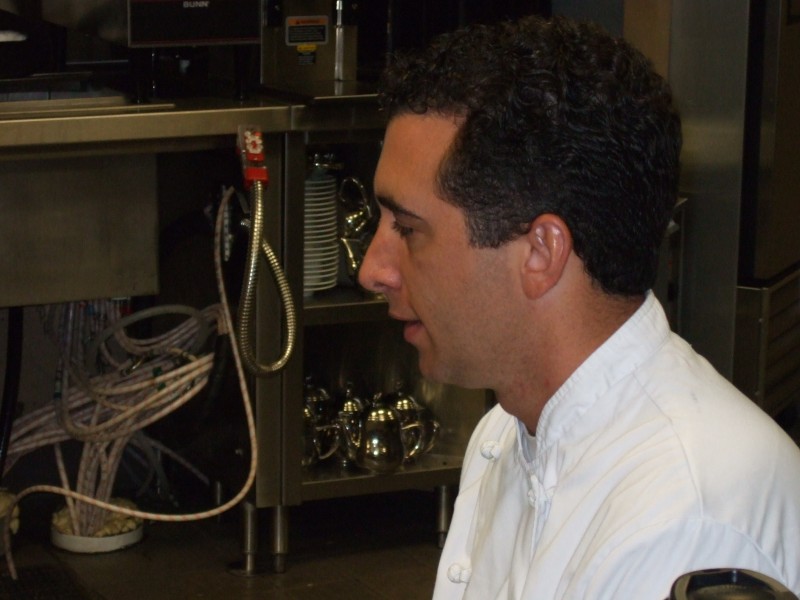 BR: Do you want to own your own place, someday?
BR: Do you want to own your own place, someday?
NC: I’m a little apprehensive about putting my own money into a restaurant, but yeah, ultimately, I’d love to own my own restaurant.
BR: What style do you think it would be?
NC: I’d have to say, just American. Focus on the ingredients that are available. Work with local producers, local purveyors. You make what is available to you something special. Ultimately, you work with local techniques. I’m not all about fusion, but I think there’s ingredients and techniques from around the world that have their place together.
BR: We’ve spoken a little bit about how or what it takes to make a successful restaurant. Angelina’s, obviously to the public has been very successful so far. What do you feel you could be doing better, as a whole, as a staff, to make yourself even better?
NC: Well, on our end, the kitchen, obviously we want to work on timing. Making sure our customers are getting their food when they are supposed to. That’s something that we are not too worried about. One thing that I’m working on is my support staff back here. Making sure they are putting out the highest quality ingredients. Making sure they are putting food up exactly the the way I would. I constantly have to reinforce and tell these guys, "If you wouldn’t serve it to your mother, don’t serve it to our guests." That goes a long way. It’s something that we always need to work on. The quality of production.
BR: How about equipment in the kitchen? What’s your favorite, what can you not live without?NC: Montegue ovens are the most reliable. They rarely break down.
BR: How about some of the fun stuff? I’ve taken a tour of the kitchen paco jet (ask brian).
NC: The paco jet is a lot of fun to work with.
BR: Tell us about that.
NC: You make a sorbet that tastes like its got cream in it. You can’t achieve that with any other machine.
BR: Tell us how that’s done.
NC: Well you basically make the sorbet mix and rather than putting it into an ice cream machine you freeze it as is. Normally, you would have large chunks of ice crystals in it, it’s not going to be palatable. What this machine does is, it shaves it, three times as fine as ice crystals. It creates one of the smoothest, most creamiest flavored sorbets or gellatos that you could possibly imagine. As a chef you can also create savory sorbets and savory ice creams. You can create sorbets without sugar which is impossible with a regular ice cream machine. So you can do your Gazpacho sorbets and what not. It’s a lot of fun.
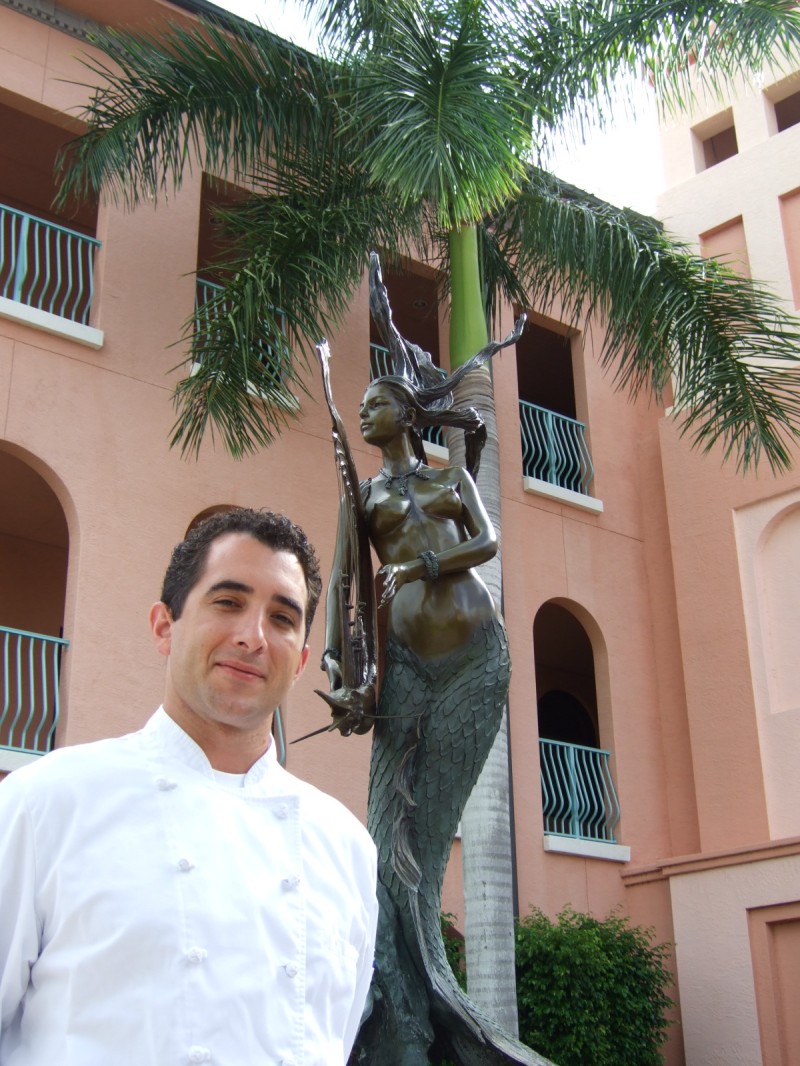 BR: It’s all about mouth feel. It really is. It almost tricks the mind into thinking it’s having something that its really not.
BR: It’s all about mouth feel. It really is. It almost tricks the mind into thinking it’s having something that its really not.
NC: Exactly.
(Brian and Nick talk about their experience using this machine. Brian used it in school but didn’t realize what the potential was. Nick never had an opportunity to work with one before Angelina’s.)
NC: One of my new toys, I’ve always enjoyed smoking things, but I just bought a smoker. I’ve been playing with smoking food. Smoked a rack of wild boar from south Texas for a wine dinner the other day. Used cherry wood. That was tasty.
BR: Heard of the smoking gun?
NC: I saw it on top chef the other day. I’m not sure if that’s a novelty.
BR: I’ve got one, but I haven’t had a chance to use it yet.
NC: I think it’s neat, something that will add a little smoke flavor real quick. On large scale production, I’m not sure it would work. I like large pieces of meat, smoking them for a couple of hours. It’s tricky to get a good smoke.
BR: All the aspects on your menu, you’ve got pastries being done up front, flatbreads being done back here. Have you designed everything or is it a collaboration of ownership and yourself.
NC: We collaborated on the overall layout , obviously what I think would work and what someone else thinks would work. I don’t claim to know exactly what’s going to work out there. I think I have a pretty good idea, so do the other members of our staff. We came together and came up with the best plan. Now all the items on the menu, pretty much mine. I had pretty much free rein to come up with the menu that I thought was best. We took it from there. Unless it’s your place, it’s going to go through ‘committee’. But to have that authority to create a menu from top to bottom is something that I’ve never experienced before. It was great.
BR: How talented is your support staff? How hard are on them when things aren’t going right?
NC: My support staff is very, very talented. I trust both my sous chefs to run the restaurant. If I weren’t here, I trust that it would be run exactly the way it would if I was here. They both know a lot about cooking, they both share the same passion that I do. So, it’s very important to have people like that. Other support staff, we look to hire people that want to be chefs. We’re not looking to hire people that treat this just as a job. We want people that want to progress, that ultimately want to be chefs.
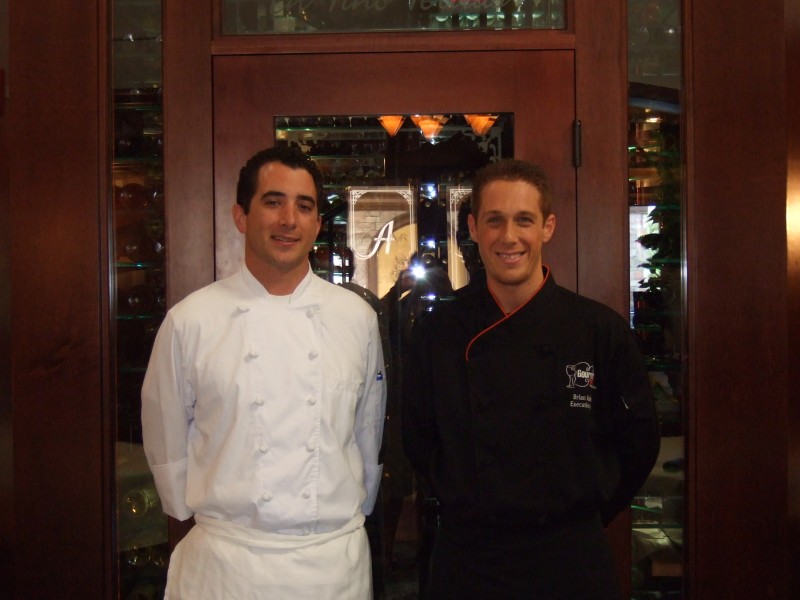
BR: In closing, if you want to say one thing to all the young chefs and u:p and coming chefs aspiring to be as successful as they can in this industry. What would your message be?
NC: Focus on the details. Don’t take shortcuts. Be passionate about your love for food, your love for the industry. That will translate. Never sell yourself short. Have fun.


